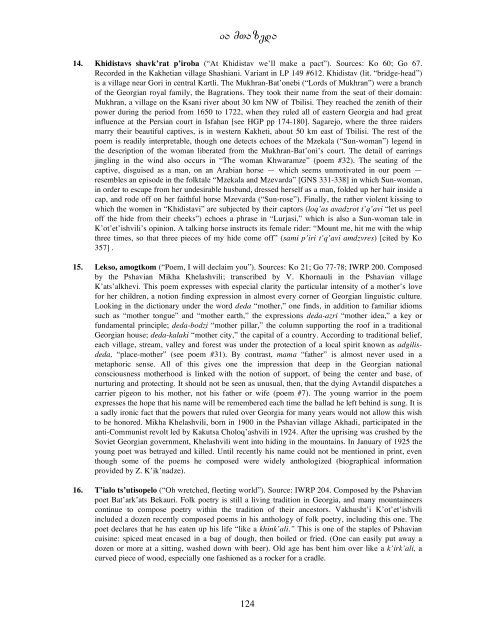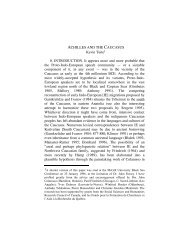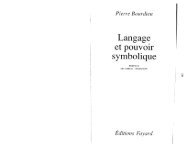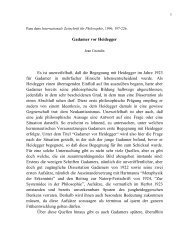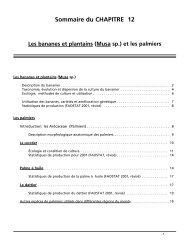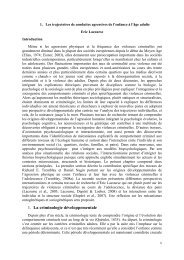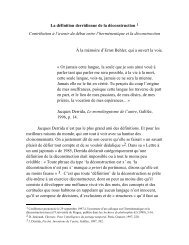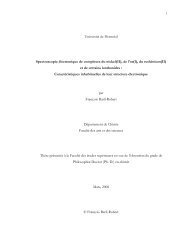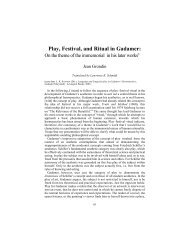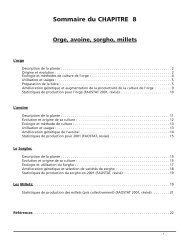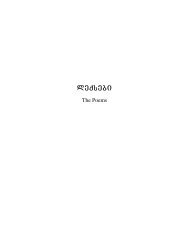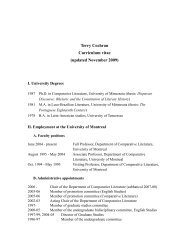Create successful ePaper yourself
Turn your PDF publications into a flip-book with our unique Google optimized e-Paper software.
ia mtazeda<br />
14. Khidistavs shavk’rat p’iroba (“At Khidistav we’ll make a pact”). Sources: Ko 60; Go 67.<br />
Recorded in the Kakhetian village Shashiani. Variant in LP 149 #612. Khidistav (lit. “bridge-head”)<br />
is a village near Gori in central Kartli. The Mukhran-Bat’onebi (“Lords of Mukhran”) were a branch<br />
of the Georgian royal family, the Bagrations. They took their name from the seat of their domain:<br />
Mukhran, a village on the Ksani river about 30 km NW of Tbilisi. They reached the zenith of their<br />
power during the period from 1650 to 1722, when they ruled all of eastern Georgia and had great<br />
influence at the Persian court in Isfahan [see HGP pp 174-180]. Sagarejo, where the three raiders<br />
marry their beautiful captives, is in western Kakheti, about 50 km east of Tbilisi. The rest of the<br />
poem is readily interpretable, though one detects echoes of the Mzekala (“Sun-woman”) legend in<br />
the description of the woman liberated from the Mukhran-Bat’oni’s court. The detail of earrings<br />
jingling in the wind also occurs in “The woman Khwaramze” (poem #32). The seating of the<br />
captive, disguised as a man, on an Arabian horse — which seems unmotivated in our poem —<br />
resembles an episode in the folktale “Mzekala and Mzevarda” [GNS 331-338] in which Sun-woman,<br />
in order to escape from her undesirable husband, dressed herself as a man, folded up her hair inside a<br />
cap, and rode off on her faithful horse Mzevarda (“Sun-rose”). Finally, the rather violent kissing to<br />
which the women in “Khidistavi” are subjected by their captors (loq’as avadzrot t’q’avi “let us peel<br />
off the hide from their cheeks”) echoes a phrase in “Lurjasi,” which is also a Sun-woman tale in<br />
K’ot’et’ishvili’s opinion. A talking horse instructs its female rider: “Mount me, hit me with the whip<br />
three times, so that three pieces of my hide come off” (sami p’iri t’q’avi amdzvres) [cited by Ko<br />
357] .<br />
15. Lekso, amogtkom (“Poem, I will declaim you”). Sources: Ko 21; Go 77-78; IWRP 200. Composed<br />
by the Pshavian Mikha Khelashvili; transcribed by V. Khornauli in the Pshavian village<br />
K’ats’alkhevi. This poem expresses with especial clarity the particular intensity of a mother’s love<br />
for her children, a notion finding expression in almost every corner of Georgian linguistic culture.<br />
Looking in the dictionary under the word deda “mother,” one finds, in addition to familiar idioms<br />
such as “mother tongue” and “mother earth,” the expressions deda-azri “mother idea,” a key or<br />
fundamental principle; deda-bodzi “mother pillar,” the column supporting the roof in a traditional<br />
Georgian house; deda-kalaki “mother city,” the capital of a country. According to traditional belief,<br />
each village, stream, valley and forest was under the protection of a local spirit known as adgilisdeda,<br />
“place-mother” (see poem #31). By contrast, mama “father” is almost never used in a<br />
metaphoric sense. All of this gives one the impression that deep in the Georgian national<br />
consciousness motherhood is linked with the notion of support, of being the center and base, of<br />
nurturing and protecting. It should not be seen as unusual, then, that the dying Avtandil dispatches a<br />
carrier pigeon to his mother, not his father or wife (poem #7). The young warrior in the poem<br />
expresses the hope that his name will be remembered each time the ballad he left behind is sung. It is<br />
a sadly ironic fact that the powers that ruled over Georgia for many years would not allow this wish<br />
to be honored. Mikha Khelashvili, born in 1900 in the Pshavian village Akhadi, participated in the<br />
anti-Communist revolt led by Kakutsa Choloq’ashvili in 1924. After the uprising was crushed by the<br />
Soviet Georgian government, Khelashvili went into hiding in the mountains. In January of 1925 the<br />
young poet was betrayed and killed. Until recently his name could not be mentioned in print, even<br />
though some of the poems he composed were widely anthologized (biographical information<br />
provided by Z. K’ik’nadze).<br />
16. T’ialo ts’utisopelo (“Oh wretched, fleeting world”). Source: IWRP 204. Composed by the Pshavian<br />
poet Bat’ark’ats Bekauri. Folk poetry is still a living tradition in Georgia, and many mountaineers<br />
continue to compose poetry within the tradition of their ancestors. Vakhusht’i K’ot’et’ishvili<br />
included a dozen recently composed poems in his anthology of folk poetry, including this one. The<br />
poet declares that he has eaten up his life “like a khink’ali.” This is one of the staples of Pshavian<br />
cuisine: spiced meat encased in a bag of dough, then boiled or fried. (One can easily put away a<br />
dozen or more at a sitting, washed down with beer). Old age has bent him over like a k’irk’ali, a<br />
curved piece of wood, especially one fashioned as a rocker for a cradle.<br />
124


